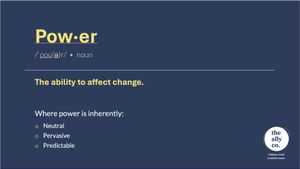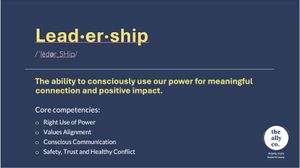Most leadership programs cover strategy, communication, and team building. But almost none talk about power.


Not just “positional” power, but a shared understanding of what power is, how it works, and the skills to navigate the dynamics that inevitably arise when people work together.
Without this, leaders are left addressing symptoms of deeper issues - conflict, low engagement, performance struggles - without the tools to address the root cause. It’s like trying to reach a new destination without a map or compass.
At The Ally Co., we work with leaders to cultivate awareness and skill in the use of power: to navigate power more consciously and ethically.
In this post, we’re sharing core principles and practical tips to help you become more conscious in how you use and operationalize your power for good.
3 Guiding Power Principles
1. Power is Everywhere
Power dynamics exist in every relationship - from parenting to the workplace. We often notice them most when there’s friction such as competing priorities, unmet needs, or power struggles.
Most leaders haven’t been taught to recognize or work with power, and in the absence of awareness and skill, we default to habits, coping strategies, or emotional reactions (outbursts, passive-aggression, withdrawal).
2. Power Awareness is Foundational
At its core, leadership is about the willful and skillful use of power.
Without shared definitions, misunderstandings and tension are inevitable. The Right Use of Power™ framework gives leaders a common language and practical tools for making power discussable, and actionable.
3. Power Shapes Everything
From productivity to equity, engagement, and capacity - power is always at play.
What we call “conflict or tension” is often a disguised power struggle. If we don’t see it, we risk blaming others rather than addressing the underlying dynamics.
Build Your Power Awareness Playbook
A strong playbook for navigating power dynamics includes:
- Self-awareness of your own power and its impact
- Recognition of power in others and in systems
- Shared language to navigate power differences
- Skills to transform conflict into connection
The alternative? Leaders figuring it out alone, or never learning at all :(.
Want to talk more about this?
Pathway #1: Follow us online on LinkedIn or YouTube
Pathway #2: Check out The Co. to see if it's for you
Pathway #3: Contact us or reach out to Jeff directly.
We’d love to learn about your journey (and to contribute if we can).
